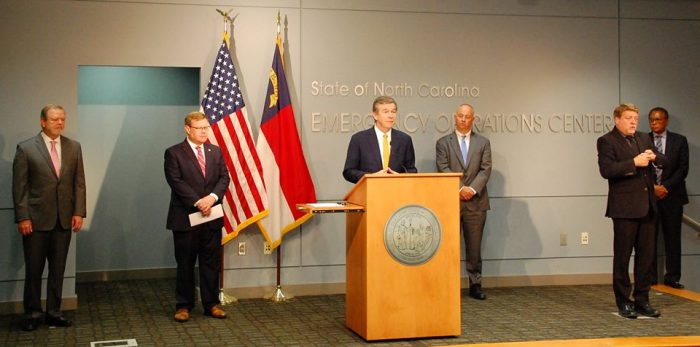
On Monday morning, May 4, Governor Roy Cooper signed the following COVID-19 relief bills into law:
“I am signing into law two critical relief bills that will provide assistance to families, schools, hospitals and small businesses as our state battles COVID-19,” said Governor Cooper. “There is more work ahead of us, and I hope the spirit of consensus behind these bills will continue.”
The Governor was joined by House Speaker Tim Moore, Democratic House Leader Darren Jackson, Senate President Pro Tem Phil Berger and Democratic Senate Leader Dan Blue.
“The General Assembly crafted a bipartisan COVID-19 relief package that puts North Carolina on the right path to recovery. Governor Cooper’s signature on these bills sends a signal to our citizens that our state is moving past this crisis and that action is being taken to address their concerns,” said Senate President Pro Tem Phil Berger.
“I am proud of the work that we have done in the Senate to address the pressing needs in our state,” said Senate Democratic Leader Dan Blue. “I look forward to working with Senator Berger on the next COVID-19 relief package so that we can build a stronger, more resilient for all North Carolinians.”
“North Carolina is leading the nation’s recovery through bipartisan consensus for swift action to assist every community in our state affected by this pandemic. I appreciate the successful collaboration among our legislative colleagues and the Governor to provide this powerful support for North Carolinians.” said Speaker of the House Tim Moore
“Citizens expect bipartisan progress and we are off to a good start. Now we need to do more for front-line workers, the unemployed, and people without health insurance.” said House Democratic Leader Darren Jackson
The relief package, which was passed unanimously, includes almost $1.6 billion in relief measures for critical expenditures related to public health and safety, educational needs, small business assistance, and continuity of state government operations. Of this amount, $1.4 billion has been appropriated and $150 million is set aside in a reserve fund for future local government needs.
The package also contains key policy changes to support North Carolinians as the state battles COVID-19.
HB 1043, the spending package, allocates federal funding sent to the state from the CARES Act. It includes:
- $50 million to provide personal protective equipment and sanitation supplies
- $25 million to support enhanced COVID-19 testing and tracing
- $125 million in small business loans administered through the Golden LEAF Foundation
- $50 million in health support for underserved communities including rural areas and minority communities
- $95 million to support North Carolina hospitals
- $20 million to support local health departments and the State Health Lab
- $75 million for school nutrition programs
- $70 million for summer learning programs
- $30 million for local schools to purchase computers and other devices for students
- $6 million for food banks
- $9 million for rural broadband
- $85 million for vaccine development, antibody testing, community testing, and other COVID-19-related research at Duke University, UNC-Chapel Hill, East Carolina University, Campbell University, and Wake Forest University.
Senate Bill 704 contained provisions to help North Carolinians. It includes:
- An extension of driver’s license and registration expiration deadlines
- Waived interest on tax payments normally due in April
- Modifies end-of-grade testing requirements for public schools
- Adjusts the 2020-21 K-12 public school calendar
- Allows pharmacists to administer a COVID-19 vaccine once it is developed









